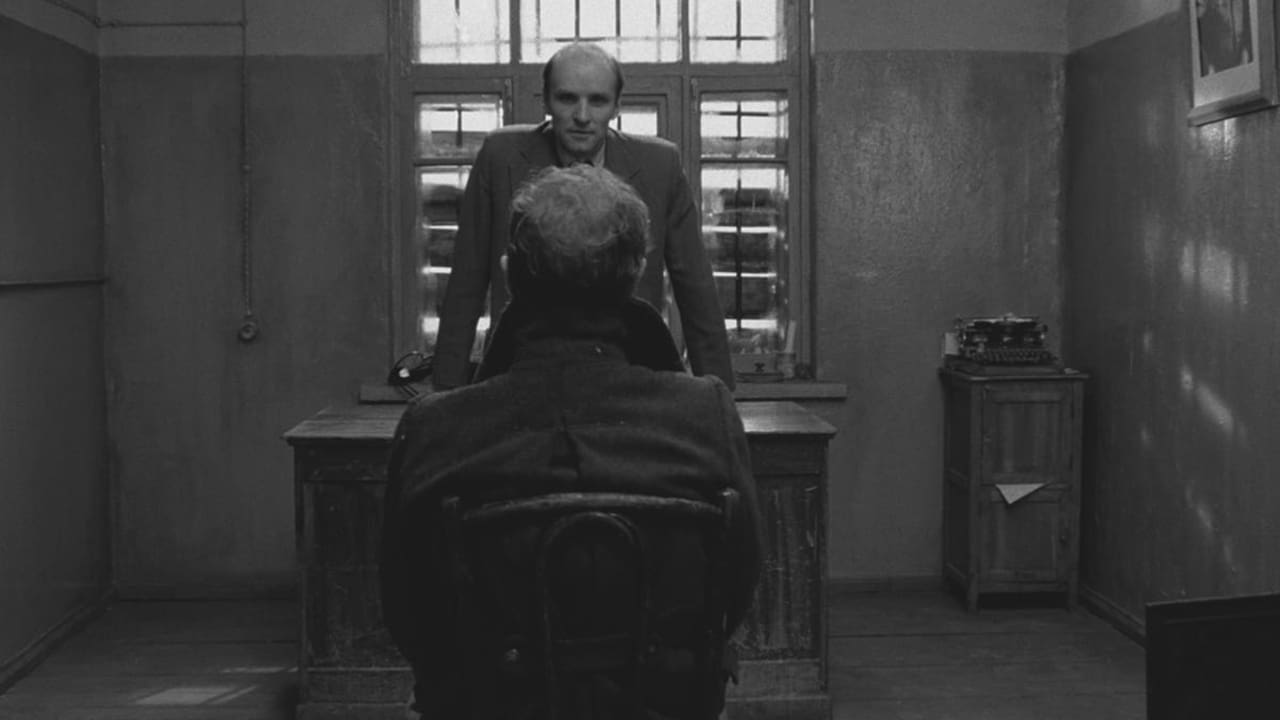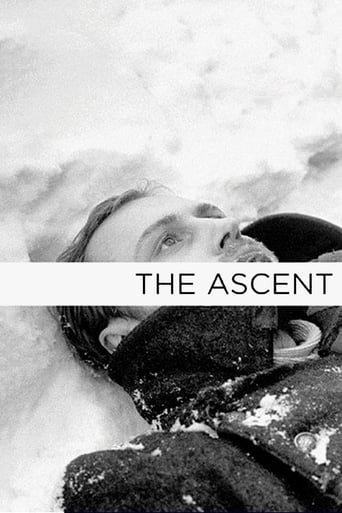

Set in wartime Belarus, "The Ascent" is a stark commentary on war and its effects on men and society. A ragged band of partisans is desperately trying to make their way over snow covered fields and through bleak forests, while being hunted by Nazi forces. Two of the men, Sotnikov and Rybak, are chosen to attempt a dangerous traverse of the countryside to find food. They come in contact with others who are barely hanging on to life, some who have made hard decisions about loyalty, and those who would kill them.This is a gripping story that is sometimes difficult to watch. And it asks the viewer to judge the two protagonists, who take different paths. Some see strong religious imagery in the film, but its central themes are about patriotism, which has perhaps become fetishized, and the consequence of fear. It asks the viewer to share the terrible situations of these victims of war and to decide which is a hero, if either. Director Larisa Shepitko expertly depicts people in survival mode, where there are no good choices.Because of its content, this film was not seen for about twenty years. Now it can be appreciated for its effective portrayal of war's inhumanity.
... View MoreAscent was an incredibly weak film for me. It tells a good story but is dragged down by horrible pacing. At the end, the experience I got out of the movie was barely worth the time invested into it.I'm not trying to say that the message of the movie is boring - it's not. The world is clearly fascinated by the story of Judas. But the film drags on much longer than it has to. The opening scene, while well-shot, brought nothing to the story. It could have just as easily started when the two soldiers stumble into Demchikha's house. The scene where the inspector is interrogating Sotnikov also takes too long. The inspector is steely and unyielding, but that much is established in the first four minutes of his screen time. Later on, Demchikha begs to be spared twice as she is being walked off to the execution grounds. These parts of the story, and others, were unnecessary.Meanwhile, there are parts of the story I would expand. When the soldiers stumbled in Demchikha's house, we saw a great deal of the innocence they're fighting for. I wish the movie had spent more time there with Demchikha and her children before they were caught. It's not that I wanted the movie to be over sooner, but I felt it expanded certain points unnecessarily at the expense of others.This got so bad, I felt like the main plot was being spoon-fed to me. I understand it's a Judas story. Why did the woman in the final scene stop Rybak to call him Judas? From the moment the two soldiers are locked up, we see it is about Judas. It couldn't have been more obvious if the Germans had paid him 30 pieces of silver.All of this takes away from some otherwise fantastic work. The fact that the film is shot in black and white is genius, bringing the viewer back to WWII. The hanging scene was almost perfect, with Sotnikov looking into the little boy's eyes before dying. And the ending scene was iconic. Rybak looks like a fat worm as he tries to stick his head through his belt before giving up. This all makes for a wonderful movie that everyone should see, but only if they bring a book and three bags of popcorn.One thing I just did not understand was the inspector. His entire character bugged me. In that hat and coat, he looked more like a newspaper salesman than anyone associated with the military. But the strangest part was how he acted. He is supposed to be the villain and is quite a good one but there are a handful of scenes where he breaks. He seems genuinely sad that these people are about to die. This I understand - he is being humanized. What I don't understand is why he doesn't do anything about it. I kept expecting him to let someone go. Surely he has the authority. At least Demchikha, with three kids. Who would insist they kill her? He seems to want to do something about it. But then he doesn't and just walk away looking very sad.
... View MoreIt comes as no surprise that Larisa Shepitko was married to Elem Klimov, who would later direct the most harrowing war film ever made, 'Come and See (1985).' 'The Ascent (1977)' – Shepikto's final completed film before a premature death – is built in very much the same mould. Set during WWII, the film follows a pair of Soviet partisans who try to secure food for their starving army while evading the occupying German forces. The first forty minutes are agonisingly tense, as the two men drag themselves though the harsh, snow-covered landscape, the world around them completely sapped of life, warmth and colour (indeed, so monotonously drab is the scenery that it literally took me this long to realise that the film was shot in black-and-white).Following the partisans' capture by German soldiers, the film becomes a cold meditation on loyalty and morality. Whereas Sotnikov (Boris Plotnikov) refuses to betray his army, even under extreme duress, the less resolute Ryback (Vladimir Gostyukhin) attempts to save himself. Is he wrong to do so? Ryback's betrayal is disheartening, but the film doesn't immediately condemn his actions are treacherous; instead, the viewer is forced to consider what their own response might be in such a situation. Shepitko pities Ryback as the Bible pities Judas. Both men betrayed their allies to the enemy, and were forced to watch them executed. However, whereas Judas committed suicide by hanging (at least according to Gospel of Matthew), Ryback finds even that option closed to him – in an excruciatingly taut climax, the belt around his neck becomes unfastened.'The Ascent' draws its emotional power from Shepitko's astonishing pursuit of realism. I have no doubt that the two principal actors spent days on end clambering across the snow-covered earth on their hands and knees, and, indeed, so convincing is their misery that I actually developed a cold while watching the film (seriously, I did). Interestingly, the film interjects on this reality on several occasions, as Ryback imagines himself making a bid for freedom, and then being gunned down by his German captors. This device, though unusual, works well with its Biblical allegory; Ryback is facing a trial of his worthiness, and, faced with a new dilemma at every turn, he consistently chooses the selfish alternative, his own life the only deciding criteria. At film's end, he is still alive, but the nightmare of war and guilt persists.
... View MoreReading the comments I am struck by the obvious effect this wonderful film has on viewers. But, how can you watch this movie and not reflect that the artful dialog was a subtle and oh so daring rebuke to the authorities "in control" in what was then the USSR at that moment in history? It wasn't the souls only in the time and place of the action being revealed. The questions, superficially asked, are nakedly provocative when directed to the here and now. Who are the real "collaborators"? I marvel that the writer stayed out of prison. I read somewhere that great stress can be a catalyst for producing great art. This film is a masterpiece of misdirection, apparently pointing one way, while asking the audience to "look over my shoulder, at what I'm really talking about." What courage.
... View More